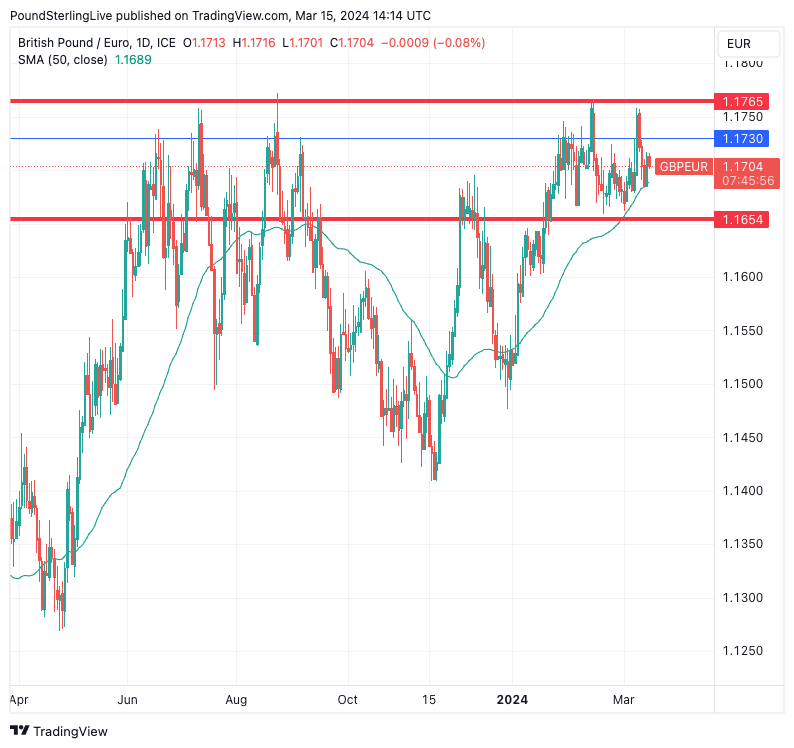GBP/EUR Week Ahead Forecast: Inflation, Bank of England In Focus
- Written by: Gary Howes
- GBP/EUR hovers near top of range
- Retest of 2024 highs possible
- But inflation must beat expectations
Bank of England, retail sales also pose risks

Image © Bank of England
The Pound to Euro exchange rate is consolidating near the top of its range and another retest of the 1.1750 area is possible if this week's data surprises to the upside and the Bank of England repeats that it's too soon to consider cutting interest rates.
GBP/EUR has proven a relatively predictable customer thus far in 2024 as rallies to the 1.1750 area reliably falter and give way to a retreat back to below 1.17.
Last week, this price action was repeated as predicted in our previous Week Ahead Forecast, but declines have been shallow and the ability to hold near 1.17 suggests the market could be set for a repeat test of the upper range.
Above: GBP/EUR at daily intervals. Track GBP and EUR with your own custom rate alerts. Set Up Here
Note that daily closes above 1.1730 (blue horizontal line on the chart) are rare, and we don't see the exchange rate breaking above the 1.1765 high anytime soon (this corresponds to a floor in Euro-Pound at 0.85).
Such a move requires a significant deterioration in Eurozone data that materially bumps up expectations for the quantum of European Central Bank (ECB) rate cuts likely in 2024. At the same time, incoming UK data must be firm enough to ensure the Bank of England raises interest rates after the ECB does.
To be sure, some big banks, such as Barclays and BNP Paribas, reckon a break towards 1.20 and above will eventually occur, but we suggest the coming week is too soon.
Compare Currency Exchange Rates
Find out how much you could save on your international transfer
Estimated saving compared to high street banks:
£2,500.00
Free • No obligation • Takes 2 minutes
Those with euro purchase requirements should, therefore, look at forays above 1.1720 as offering a decent buying opportunity.
The main risks for the Pound in the coming week are the release of inflation numbers on Wednesday, PMIs and the Bank of England decision on Thursday and Friday's retail sales.
UK Inflation: Tuesday, 07:00
The biggest data event on the Pound's calendar is the release of headline CPI inflation, where a rate of 3.6% is expected for February, down from 4.0% in January. The month-on-month increase is expected to read at 0.6%, up from -0.6%.
The Pound will come under pressure if the print undershoots expectations and prompts markets to raise expectations for a June rate cut at the Bank of England.
"We are forecasting a sustainable return to 2% inflation this year," says Brian Martin, Head of G3 Economics at ANZ. "We forecast wage growth will fall towards 4% y/y by mid-year, allowing the BoE to be confident that underlying inflation is falling sustainably."
Bank of England: Thursday, 12:00
The Bank of England will keep Bank Rate unchanged at 5.25%, but any changes to the accompanying statement and vote composition will potentially move markets.
Should another member of the Monetary Policy Committee (MPC) join Swati Dhingra and vote for a cut, the Pound could come under pressure. Any shift in guidance that hints at the prospect of future rate cuts could also weaken the Pound.
"We may see a dovish shift in the voting pattern, whereby one, or perhaps both, of the hawks shift their allegiance in favour of no change. This could provide some near-term downside to sterling," says Matthew Ryan, Head of Market Strategy at Ebury.
"The GBP could be vulnerable to any evidence that more MPC members are coalescing around the view for stable rates and/or rate cuts," says Valentin Marinov, Head of G10 FX Strategy at Crédit Agricole.
Markets are currently fully priced for an August rate cut, which is appropriate according to ANZ's Martin: "We think August is the earliest that the MPC will have enough evidence of progress on inflation to start cutting rates. The May labour market report and June inflation data will feed into its updated macroeconomic forecasts as part of the Monetary Policy Report."
UK PMIs: Thursday, 09:30
Thursday sees the release of PMI data for March, which will give a strong snapshot of this month's activity. The headline services PMI is expected to read at 54.2 which would indicate a strong expansion and confirm the recession is truly over.
Markets are positioned 'long' on the Pound, which hints that it will require a sizeable beat to prompt any meaningful gains. By the same token, the bigger reaction would likely be to the downside on any undershoot in the data.
UK Retail Sales: Friday. 07:00
January's release of December retail sales showed an unexpectedly large slump, which prompted a decent sell-off in the Pound.
Meanwhile, February's release showed a 3.4% y/y increase in January, indicating that the economy likely exited recession at the start of the new year.
In short, the retail sales print matters, and another strong reading could shore up the Pound and confirm that a strong recovery is underway.
Track GBP and EUR with your own custom rate alerts. Set Up Here
Eurozone PMIs
9:00 on Thursday sees the release of Eurozone retail sales where markets expect a reading of 50.5 for services, confirming the sector is back in growth.
However, manufacturing is expected at 47 and the composite at 49.7.
The Euro has benefited from a run of better-than-expected readings of late, which suggests any undershoot in the figures would trigger the kind of disappointment that would prompt a decent EUR selloff.
"Next week, FX investors will focus on the preliminary Eurozone PMIs and the German ifo for March. With some positives related to the improving Eurozone outlook already in the price of the EUR, we think that the currency could be vulnerable to any potential downside surprises from the data," says Valentin Marinov, Head of G10 FX Strategy at Crédit Agricole.
The German ifo release is due Friday at 9:00 GMT, with the market looking for the business climate component to increase to 86 from 85.5 and the current assessment to rise to 87.2 and 86.9.







